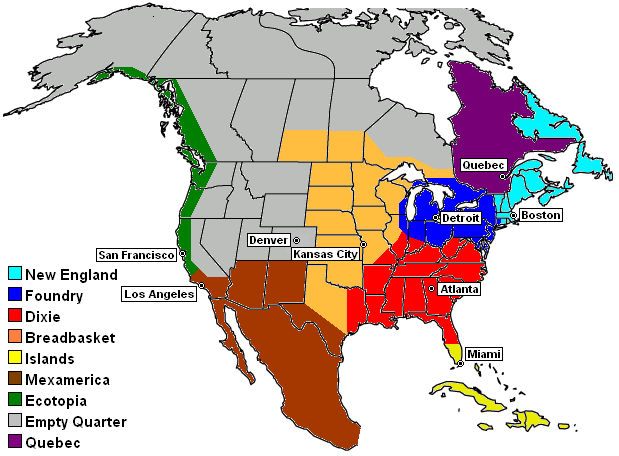With some major restructuring, I would be in favor of a North American Union. The main problem is, as many have pointed out, the polar nature of such a Union. Given the obvious size differences between Canada/USA/Mexico, the smaller members would feel perpetually threatened by the gargantuan USA. Oddly, I think Canada is somewhat similar with Ontario holding a destabilizingly large amount of political capital. Peel region even has similarities. In order to avoid an obvious polarization, the national structure of N. America would have to be readdressed before tackling it's supranational composition. Before tackling the desirable supranational structure a NAU could take, I will adress the national reforms which would be necessary.
The national composition of N. America would have to be dissolved into 8-10 "successor states." I think this would be worthwhile even without a super national structure, as the USA is to large for it's government to function responsibly. Across the board, the US (and Canada to a lesser extent) government has a pretty poor track record on providing services. Partially, it's huge size prohibits any meaningful accountability. Borrowing from Joel Garreau's theories, N. America can be divided into 9 distinct political and cultural regions. Broadly, those are:
New England (Atlantica): An expanded version of the current region, including Atlantic Canada. Capital, Boston.
New France/Quebec: Quebec, pretty strait forward. I would suggest moving the capital to Montreal, but small differences.
Rust Belt/ Great Lakes: The industrial area surrounding the Great Lakes, including Michigan, Illinois, Upstate New York, Pennsylvania and S. W. Ontario. I would imagine Toronto as the capital, but that might just be self interest.
Dixie: The area which used to be the Confederacy, basically S. Eastern USA. Capital in Atlanta.
Caribbean: The Islands, as well as a good chunk of Florida. We would take back Cuba as well. Capital would probably be Miami, though I guess Havana could work.
Meximerica: Stretching from Southern California to South Western Texas and the northern chunk of Mexico. Capital either in Mexico city or LA. Like the Hispanic equivalent of Quebec.
Pacific North West: Self explanatory, N. California, Oregon, Washington and S/W BC (and Vancouver Island). Hippy capital of earth. Seattle, San Fran and Vancouver all present decent options for capitals.
Breadbasket: The agricultural regions stretching across the semi-arid grasslands in Central N. America. The southern Prairies down through Kansas and the Great Plains. Capital, I dunno, Kansas City?
Badlands: This is the most problematic of Garreau's regions, IMO, basiclly compromising the sparsely populate territories in N. Canada all the way south through Wyoming and Utah. Capital would be Denver, not the greatest political creation IMO.
A crude rendering, not entirely accurate with my interpretations but generally illustrative:
This division was constructed in 1981, and is not perfect in a number of ways. Perhaps the biggest omission is the lack of focus on the N. American mega regions. By which I mean the Bos-Wash corridor, the I-85 Corridor, Bajalta Corridor, the Bay Area, Cascadia, Chi-Pitts, Tor-buff (we have the worst name, imo) and such. It would be interesting to see each of these emerge as self governing entities while the more sparsely populated areas, dependent on extractive industries, would maintain an entirely different set of governments. It does serve to illustrate though how we could subdivide the continent into more balanced states.
Following that, an EU style body could be implemented. It would coordinate major infrastructure projects (like the Super Highway), ensure the
four freedoms are upheld across the constituents, maintain a common currency and monetary policy. Policy decisions related to health care, education and social policy would be relegated to the successor states. The thing would be paid for by a direct 10% VAT. Basically an EU for N. America, without the absurd Common Agriculture Program. Over time, as supranational governance became more and more common place, perhaps the Australasian countries could be integrated.





